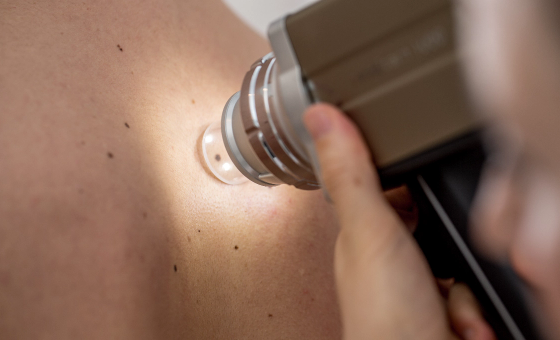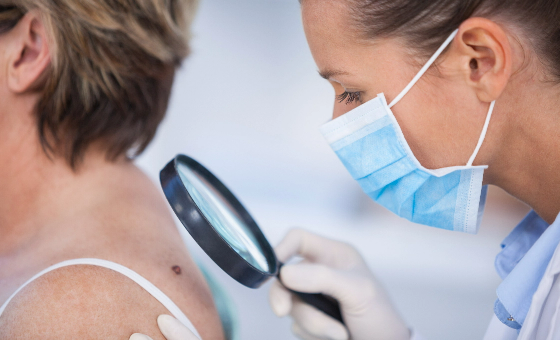If you or a family member have been diagnosed with skin cancer, we understand how frightening this can be. Skin cancer is the most common of all cancers and accounts for nearly half of all cancers in the United States.
At Premier Dermatology, our experienced, collaborative team of board-certified dermatologists and fellowship-trained Mohs skin cancer surgeon combine the very best and latest in expert clinical knowledge and technology, with a comprehensive and compassionate approach to care. This allows us to offer our patients a personalized program of patient-centered care for all of those we treat.
BOOK AN APPOINTMENTWhat is Skin Cancer?
Skin cancer develops when skin cells grow out of control and multiply quickly. This happens when mutations occur in the DNA of skin cells. These mutations cause skin cells to undergo rapid growth, forming cancer cells. Skin cancer can develop anywhere on the body, but excessive exposure to sunlight greatly increases your chances of developing the disease.

Basal cell carcinoma, squamous cell carcinoma, and melanoma are the main types of skin cancer. Here’s a closer look at each type:
Basal cell carcinomas: Is the most common skin cancer type. It usually affects areas of the body receiving the most sun exposure, including the face, head, neck, arms, and legs. Signs of basal cell carcinoma include a pink-colored patch of skin, a flesh-colored round growth, or a shiny bump that appears waxy or pearly.
Squamous cell carcinoma: Also affects parts of the body that are frequently exposed to the sun, such as the face, lips, ears, and hands. This type of skin cancer may appear as a scaly patch of skin, a firm, red bump, or a sore that never heals
Melanoma: Is the most serious type of skin cancer because it can spread quickly throughout the body. It can develop anywhere on the body, including an existing mole. It can also appear suddenly on the body, developing as a dark spot that looks much different from other marks on your skin. Symptoms of melanoma include a lesion, spot, or mole that has an irregular border and is white, black, blue, or red/pink in color.
Your options for skin cancer treatment depend on the type of skin cancer you have and its location on the body. Your skin cancer treatment options include:
Mohs surgery: Is the most accurate and precise treatment for non-melanoma skin cancer. This treatment is recommended for anyone who has recurring or difficult-to-treat skin cancers. During Mohs surgery, your surgeon removes skin cancer layer by layer. Each layer of skin is examined under a microscope until no cancerous cells remain.
Mohs surgery preserves healthy skin while ensuring that all cancerous cells are removed. The procedure is regarded for its 99% cure rate and is highly successful in treating skin cancers that develop on the scalp, ears, nose, eyelids, lips, fingers, toes, or genitals.
Cryotherapy: Uses liquid nitrogen to freeze and destroy cancerous tissue. After treatment, the dead cells gradually slough off.


Your options for skin cancer treatment depend on the type of skin cancer you have and its location on the body. Your skin cancer treatment options include:
Mohs surgery: Is the most accurate and precise treatment for non-melanoma skin cancer. This treatment is recommended for anyone who has recurring or difficult-to-treat skin cancers. During Mohs surgery, your surgeon removes skin cancer layer by layer. Each layer of skin is examined under a microscope until no cancerous cells remain.
Mohs surgery preserves healthy skin while ensuring that all cancerous cells are removed. The procedure is regarded for its 99% cure rate and is highly successful in treating skin cancers that develop on the scalp, ears, nose, eyelids, lips, fingers, toes, or genitals.
Cryotherapy: Uses liquid nitrogen to freeze and destroy cancerous tissue. After treatment, the dead cells gradually slough off.
Treatment options may vary at each location.
Please confirm your desired treatment is offered at your preferred location when scheduling.


